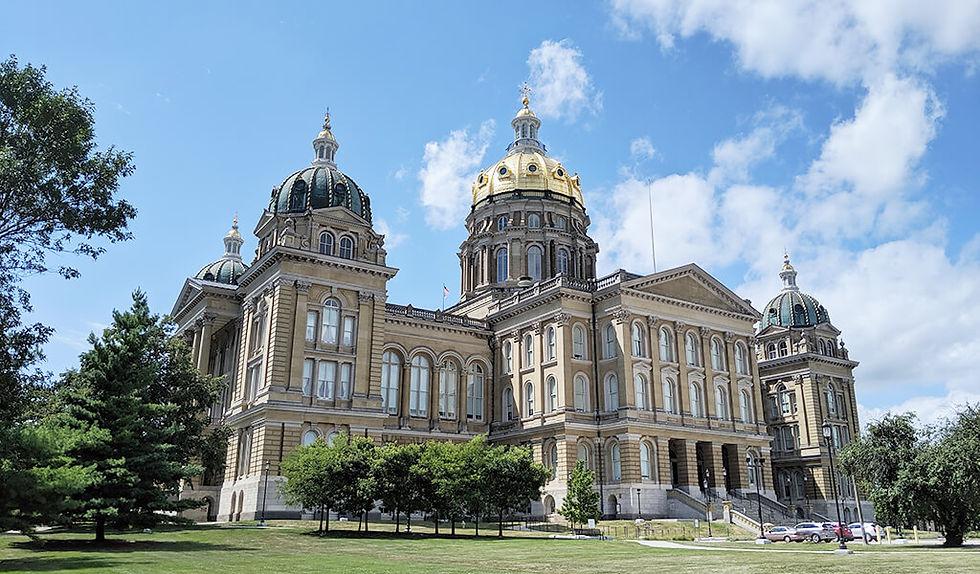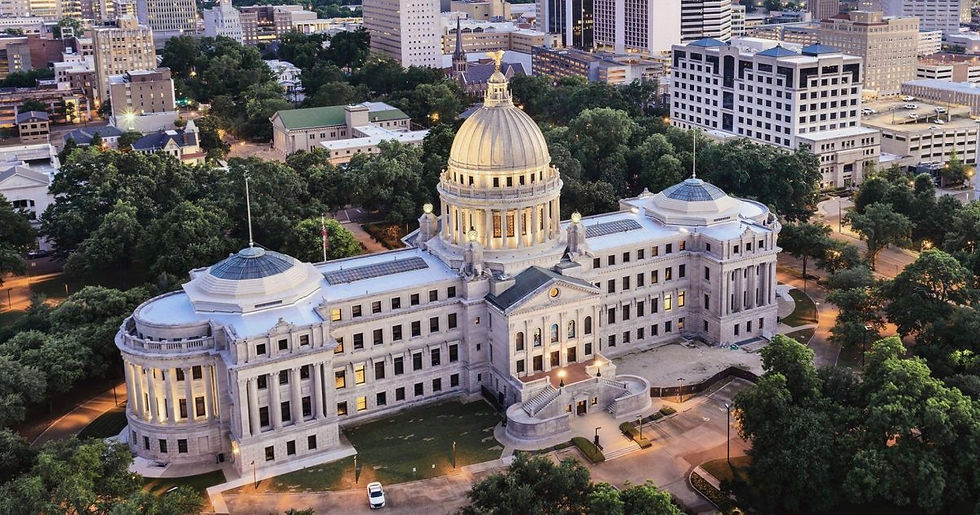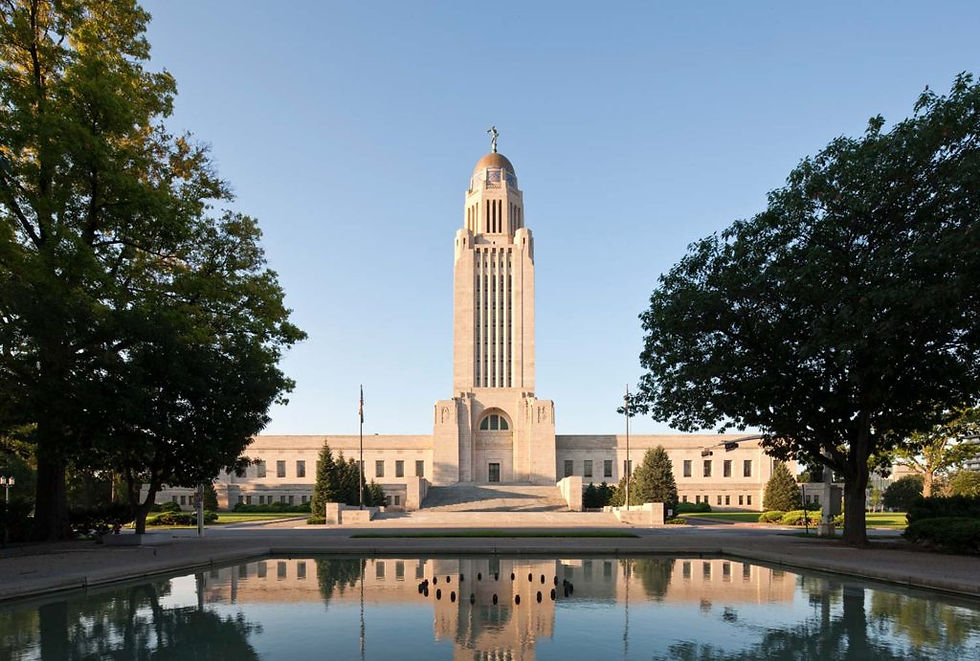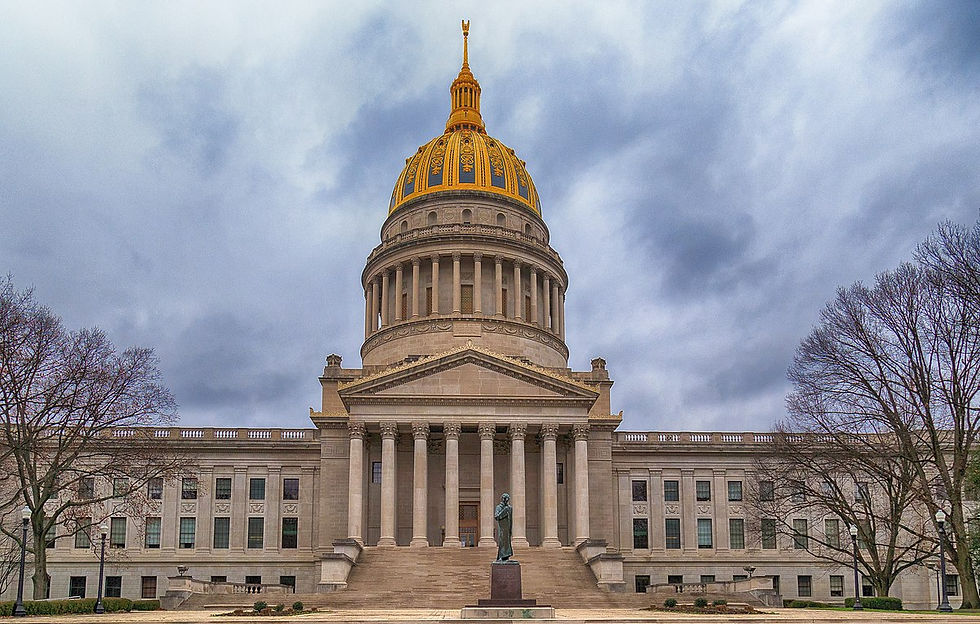Medical exceptions in abortion bans: are they really as murky as some claim?
- Chloe Chandler

- Nov 14, 2023
- 16 min read
Updated: Jan 4, 2024

On July 24, 2022, the United States Supreme Court overturned Roe v. Wade, a 1973 decision that made abortion legal in every state. This reversal drew mixed reactions–celebration and joy from the pro-life side, and devastation from the pro-choice side. The scene at the Supreme Court that day was quite a sight to behold (I was there).
Since the reversal of Roe v. Wade and Planned Parenthood v. Casey on that day, there has been an ongoing debate about whether each state’s laws allow for women to have medical emergencies, like ectopic pregnancy, treated by physicians, as the treatment of these conditions usually results in the premature death of a preborn child. Every day, I see public figures claiming that women cannot have medical conditions treated under state abortion bans. For example, see this tweet that went viral just before the Supreme Court handed down its decision in Dobbs v. Jackson.

This highlights a major issue in today’s America–far too many people don’t know what our laws actually say. Because we live in a society where there is constant pressure for public figures to comment on current political issues (just see comments on Selena Gomez’s recent Instagram posts, for example), there has been a lot of confusion surrounding the issue of medical exceptions. To make sure all debates are fact-based, I have compiled a list of each state's relevant abortion laws and the quote from each law that outlines their medical exception.

Alabama
Alabama has a more recent ban on abortion. The bill was first read in 2019. It followed a November 2018 amendment to the Constitution of Alabama that “affirm[ed] the public policy of the state to recognize and support the sanctity of unborn life and the rights of unborn children.” This amendment was a clear statement that Alabama’s state Constitution does not include a right to abortion, and does not require public funds to be used to fund abortion.
HB 314, also known as the Human Life Protection Act, makes abortion and attempted abortion felony offenses. The only exception is when “abortion is necessary in order to prevent a serious health risk to the unborn child’s mother.” This bill also ensures that a mother will not face criminal or civil punishment for getting an abortion.

Arizona
Arizona has two bans on abortion that Republicans in their state Senate say are in effect. They are ARS 13-3063 (which was on the books before Roe v. Wade was overturned) and SB 1164.
ARS 13-3063 bans most abortions, unless the procedure is necessary to save the life of the mother. In 2021, the Arizona legislature amended the law to ensure that mothers would not face punishment for getting abortions. Instead, any physician that violated the law would receive punishment.
SB 1164 is in addition to ARS 13-3063. This law bans all abortions after 15 weeks gestation, unless there is a medical emergency threatening the life of the mother, “or a serious risk of substantial impairment of a bodily function” (AZ Senate Republicans). This is the only exception to the law and, once again, does not punish the mother who gets an abortion–only the physician who performs it. Any physician who violates SB 1164 would face felony prosecution which, under ARS 13-3063, would be punishable by jail time of two to five years.

Arkansas
Arkansas currently has several laws in place that ban abortion and make strong statements that they are a pro-life state and are committed to protecting the rights and health of both mother and child. The main laws that are in effect are Arkansas Constitution Amendment 68, SB 6, and the Human Heartbeat Protection Act.
The Arkansas Constitution Amendment 68 was passed in 1988. This amendment states that “[t]he policy of Arkansas is to protect the life of every unborn child from conception until birth, to the extent permitted by the Federal Constitution.”
SB 6, also known as the Unborn Child Protection Act, was passed in 2021 and bans abortion from the moment of fertilization. This law defines abortion essentially as any act for which the purpose is to terminate a woman’s pregnancy, with knowledge that those methods can reasonably be assumed to cause the death of a preborn child. The law states that “An act [of this nature] is not an abortion is the act is performed with the purpose to: (i) Save the life or preserve the health of the unborn child; (ii) Remove a dead unborn child caused by spontaneous abortion; or (iii) Remove an ectopic pregnancy; …” It goes on to say that a medical emergency would justify an abortion, and defines “medical emergency” as a condition that requires abortion to preserve the life of the mother “whose life is endangered by a physical disorder, physical illness, or physical injury, including a life-endangering physical condition caused by or arising from the pregnancy itself.” The law also includes statements that no woman who gets an abortion will be charged or convicted of any criminal offense in the death of her own preborn child, and that it does NOT ban contraceptives.
Next is the Human Heartbeat Protection Act (other names: SB 134, Act 301, and Arkansas Code § 20-16-1301). This law was originally vetoed by the governor, but the legislature overrode the veto. It contains the same exception language as SB 6, but adds that it is also considered a medical emergency “when continuation of the pregnancy will create a serious risk of substantial and irreversible impairment of a major bodily function of the pregnant woman.” This law was passed in 2013 and bans abortion from the moment of conception.

Florida
Florida’s main abortion law is what is referred to as a “heartbeat bill,” which means that it bans abortion after six weeks of pregnancy, when a fetal heartbeat can be detected. Some say that most women don’t know they are pregnant until after 6 weeks, which they think makes the law unfair. Although there is limited data, studies show that most women find out they are pregnant between 5-6 weeks.
SB300, also known as the Heartbeat Protection Act, was passed and signed into law in 2023. This law bans abortion after six weeks of pregnancy, which is the time in which physicians can generally agree that a fetal heartbeat can be detected. Here is the language outlining the medical exception in this law:
“A physician may not knowingly perform or induce a termination pregnancy if . . . gestation age of the fetus is more than 6 weeks unless one of the following conditions is met: (a) Two physicians certify in writing that, in reasonable medical judgment, the termination of the pregnancy is necessary to save the pregnant woman’s life or avert a serious risk of substantial and irreversible physical impairment of a major bodily function of the pregnant woman other than a psychological condition. (b) The physician certifies in writing that, in reasonable medical judgment, there is a medical necessity for legitimate emergency medical procedures for termination of the pregnancy to save the pregnant woman’s life or avert a serious risk of imminent substantial and irreversible physical impairment of a major bodily function of the pregnant woman other than a psychological condition, and another physician is not available for consultation.”

Georgia
Georgia’s abortion ban is similar to Florida’s, as it is also a heartbeat bill. Its medical exception is nearly identical to the medical exception in SB 6 in Arkansas.
HB 481 was passed in 2019. It bans abortion after a preborn child has a detectable human heartbeat. It specifically states that removing a dead preborn child caused by miscarriage and removing an ectopic pregnancy are NOT included in the definition of abortion. It defines a medical emergency as “a condition in which an abortion is necessary in order to prevent the death of the pregnant woman or the substantial and irreversible physical impairment of a major bodily function of the pregnant woman.”

Idaho
Idaho’s main abortion law was a so-called “trigger ban,” which means that it was passed with the intent for it to take effect if the Supreme Court were to overturn Roe v. Wade–which, as we know, happened in 2022. Idaho passed another law last year to further clarify the circumstances in which abortions are allowed and the requirements to justify an abortion in the third trimester of pregnancy.
SB 1385, enshrined in law as Idaho Code Section 18-622, also known as the Defense of Life Act, was passed in 2020. This law bans abortion completely with limited exceptions. The exceptions include one for medical emergencies. The law says that an act is not considered an abortion if the physician performing it determined, in good faith, “that the abortion was necessary to prevent the death of the pregnant woman . . . [or] the physician performed or attempted to perform the abortion in the manner that . . . provided the best opportunity for the unborn child to survive,” unless they determined in good faith that terminating the pregnancy in that manner would have caused the death of the pregnant woman. Medical treatment provided to a pregnant woman that results in the accidental death or injury of the preborn child is not considered a violation of this law.
HB 521 was passed in 2022 to clarify that abortions are only considered lawful if they are performed in a hospital “or in a physician’s regular office or a clinic, which . . . is properly staffed and equipped for the performance of such procedures,” and only if the physician in the office or clinic has made arrangements with one or more “acute care hospitals within reasonable proximity thereof providing for the prompt availability of hospital care as may be required due to complications or emergencies that might arise.” It also clarifies that abortions may only be performed in the third trimester if they fit the definition of a medical emergency found in SB 1385, which includes a requirement to take any reasonable action to preserve the life of a viable preborn child.

Iowa
Iowa’s abortion ban, like the bans in Florida and Georgia, is a heartbeat bill. On July 17, 2023, three days after the law was signed by Governor Kim Reynolds, an Iowa state district court temporarily blocked the ban until the state’s Supreme Court could make a ruling on its constitutionality. After doing research, it appears that as of today, the law is still blocked and no decision has been reached.
HF 732 bans abortion from the moment a fetal heartbeat can be detected. It includes exceptions for caring for an incomplete miscarriage and other medical emergencies as defined in Section 146.1.
Iowa Code Section 146.1 says that, “Abortion does not include medical care which has as its primary purpose the treatment of a serious physical condition requiring emergency medical treatment necessary to save the life of a mother.” This would include things like ectopic pregnancy.

Kentucky
HB 148 was passed in 2019 as a trigger ban, like SB 1385 in Idaho. It bans abortion with exceptions for medical emergencies. This law states that it is not considered an abortion when a licensed physician performs a medical procedure that, according to their reasonable medical judgment, is necessary to “prevent the death or substantial risk of death due to a physical condition, or to prevent the serious, permanent impairment of a life-sustaining organ of a pregnant woman.” It states that the physician must take reasonable action to preserve both the life of the mother and the life of the preborn child. Medical treatment given to the mother by a licensed physician that caused the accidental injury or death of a preborn child is also not considered an abortion.

Louisiana
Louisiana Governor John Bel Edwards–who, to my knowledge, is the only governor in the United States who is both pro-life and a Democrat–signed Louisiana’s main abortion ban into law one week before Roe v. Wade was overturned by the Supreme Court. The law was sponsored by Katrina Jackson, a pro-life Democrat who is a member of the Louisiana State Senate. Ms. Jackson made an appearance on Dr. Phil in October 2022 to discuss the law with pro- and anti-abortion public figures.
SB 342 is a law that bans abortion from conception. The following are excluded from its definition of abortion:
A medical procedure performed with intent to save or preserve the life of a preborn child.
The removal of a dead preborn child when “the pregnancy has ended or is in the unavoidable and untreatable process of ending due to spontaneous miscarriage.” In these cases, a physician must certify their diagnosis of an incomplete miscarriage in writing in the woman’s medical record, and also include the results of an ultrasound.
The removal of an ectopic pregnancy, including the use of methotrexate to treat an ectopic pregnancy.
The performance of a procedure that a physician determines is necessary to “prevent the death or substantial risk of death to the pregnant woman due to a physical condition, or to prevent the serious, permanent impairment of a life-sustaining organ of a pregnant woman.” In this case, it is required for a physician to make reasonable effort to preserve the life of both the mother and her preborn child.

Mississippi
Mississippi is important for anyone interested in the history of abortion in the United States. Their 2018 Gestational Age Act was what prompted Dobbs v. Jackson, the case that led the Supreme Court to overturn Roe v. Wade and Planned Parenthood v. Casey in 2022.
HB 1510 is the law that led to Dobbs v. Jackson. It bans abortion after 15 weeks and provides exceptions for medical emergencies. Medical emergencies are defined as conditions in which “an abortion is necessary to preserve the life of a pregnant woman whose life is endangered by a physical disorder, physical illness, or physical injury, including a life-endangering physical condition arising from the pregnancy itself, or when the continuation of the pregnancy will create a serious risk of substantial and irreversible impairment of a major bodily function.”
SB 2391 is a trigger ban passed in 2007. It says that, in the event that the Supreme Court overturns Roe v. Wade, abortion will be banned in the state of Mississippi. As we know, Roe was reversed in July 2022, allowing this law to take effect. It allows for exceptions in cases where abortion is necessary to preserve the mother’s life.

Missouri
HB 126, a 2019 law, bans abortion in Missouri from the moment there is a detectable heartbeat. It says in this law that there is an exception for medical emergencies, and refers us to Missouri Code Section 188.039 to read what those exceptions are.
HB 126 is another heartbeat law. It requires a physician who intends to perform an abortion to first determine whether there is a detectable fetal heartbeat. It does allow for a medical exception. The definition of medical emergencies for this law can be found in Missouri Code Section 188.039, and it includes conditions which complicate a pregnant woman’s medical condition such that an immediate abortion of her pregnancy is necessary to prevent her death or the “serious risk of substantial and irreversible impairment of a major bodily function.”

Montana
Montana passed a law earlier this year that banned abortions after 12 weeks. This law, however, was temporarily blocked on May 18, until it can be heard and decided upon by the Montana State Supreme Court. That block is still in effect as of the time of this article.
HB 721 banned abortion after 12 weeks in Montana. It included an exception for medical emergencies, stating that abortion does NOT include an act to remove an ectopic pregnancy, or a “separation procedure performed because of a medical emergency and prior to the ability of the unborn child to survive outside of the womb with or without artificial support.” As stated previously, this law was temporarily blocked earlier this year by a Montana District Court.
The law that is currently in effect in Montana has much looser restrictions and only bans abortion after “viability,” which can vary but is typically around 20 weeks. This law is HB 471, and it also includes an exception for medical emergencies that happen after viability. These exceptions are defined in Montana Code 50-20-603 and allow abortion in the third trimester if it is necessary to prevent a serious risk to the health of the child’s mother.

Nebraska
Abortion is banned after 12 weeks in Nebraska, according to a law signed by Governor Jim Pillen in May 2023. This law was challenged by Planned Parenthood, but was ruled constitutional by a judge in the state.
LB 574 bans abortion after 12 weeks. It states, “Abortion shall under no circumstances be interpreted to include: (i) Removal of an ectopic pregnancy; (ii) Removal of the remains of a preborn child who has already died; (iii) An act done with the intention to save the life or preserve the health of the preborn child; (iv) The accidental or unintentional termination of the life of a preborn child . . .” The law defines a medical emergency as any condition which necessitates the termination of a pregnancy to prevent the death of a pregnant woman, or which “will create a serious risk of substantial and irreversible physical impairment of a major bodily function.”

North Carolina
North Carolina, like Nebraska, has a ban on abortion after 12 weeks. It was passed in 2023.
SB 20 bans abortion after 12 weeks. It explicitly states that the removal of an ectopic pregnancy is not considered an abortion. Medical exceptions are defined in this law using the same language that LB 574 in Nebraska uses to define a medical emergency.

North Dakota
North Dakota passed a law to ban abortion in 2007. This law took effect following the reversal of Roe v. Wade, but soon after, it was challenged by Planned Parenthood and blocked by a court in the state.
Before it was blocked by courts, HB 1466 banned abortion from conception in the state of North Dakota. It states that the removal of a dead preborn child caused by miscarriage, the treatment of a woman for ectopic pregnancy, and the treatment of a woman for molar pregnancy are all not considered abortions. It defines a medical emergency as a condition that necessitates an abortion to prevent a serious health risk to or the death of a pregnant woman.

Oklahoma
Oklahoma’s abortion ban is similar to many others in this list. It differs in that it states that for a condition to justify a medical emergency, it has to be a condition that cannot be fixed by delivering the preborn child.
SB 612 bans all abortions in Oklahoma except in cases of medical emergency. Medical emergency is defined in this law as a condition which “cannot be remedied by delivery of the child,” and that is necessary to save the life of a pregnant woman “whose life is endangered by a physical disorder, physical illness or physical injury including a life-endangering physical condition caused by or arising from the pregnancy itself.”

South Carolina
South Carolina passed a heartbeat law this year. It was challenged in courts, but ultimately was upheld by the South Carolina State Supreme Court.
SB 474 bans abortions in South Carolina after a fetal heartbeat can be detected which, as stated previously, is around 6 weeks. According to this law, it is not a violation of the ban for a physician to perform a procedure that they have determined is necessary to "prevent the death of a pregnant woman, a substantial risk of death of a pregnant woman due to a physical condition, or the substantial physical impairment of a major bodily function of the pregnant woman, not including psychological or emotional conditions."

South Dakota
South Dakota passed HB 1249 in 2005 to ban all abortions. In 2021, South Dakota Code Section 22-15-5.1 was put on the books. It contains the same language as HB 1249.
South Dakota Code Section 22-17-5.1, which became effective after the Supreme Court overturned Roe v. Wade, bans abortion at all stages of pregnancy “unless there is appropriate and reasonable medical judgment that performance of an abortion is necessary to preserve the life of the pregnant female.”
In 2005, the South Dakota Legislature passed HB 1249, which bans abortion except in cases where it is necessary to save the mother’s life and outlines penalties for anyone who provides an abortion to a pregnant woman.

Tennessee
Abortion is banned at all stages of pregnancy in Tennessee. Its medical exception contains language similar to that of most other laws in this list.
In 2019, Tennessee passed SB 1257, also known as the Human Life Protection Act. This law bans all abortions in the state unless a physician determines that an abortion is “necessary to prevent the death of the pregnant mother or to prevent serious risk of substantial and irreversible impairment of a major bodily function” of the mother. This is another trigger ban that took effect after Roe’s reversal.

Texas
The abortion ban in Texas is a heartbeat bill. It was the cause of much controversy after it was passed in 2021. This controversy came because the law allows for any citizen who is not an officer or employee of state or local government to bring civil action against those who provide abortions or those knowingly engage in conduct that aids or abets the performance of an abortion.
SB 8 bans abortion after a preborn child’s heartbeat can be detected. It states that an abortion can be performed if a physician believes a medical emergency exists that necessitates it. If such a situation arises, the physician must include written in the woman’s medical record: (1) their belief that a medical emergency necessitated the abortion, and (2) the specific medical condition that the physician believes required an abortion. A copy of these notations must be preserved in the physician’s practice records.

Utah
The Utah State Legislature passed a law in 2020 that bans abortion from the moment of conception except in limited circumstances, and passed a law earlier this year to require abortions to be performed in hospitals. However, Judge Andrew Stone placed temporary injunctions on these laws earlier this year after lawsuits from Planned Parenthood. Arguments have been heard for the trigger ban and we are awaiting a decision from the State Supreme Court to see whether these laws will be allowed to take effect. While we await the State Supreme Court’s decision, abortion is banned after 18 weeks in the state of Utah.
SB 174 is Utah’s trigger ban. It bans abortion from fertilization except in limited circumstances. This bill was sponsored by State Senator Dan McCay and Representative Karianne Lisonbee, and signed into law by then-Governor Gary Herbert in 2020. The law states that abortion does not include the removal of a dead preborn child or removal of an ectopic pregnancy. Its definition of a medical emergency is the same as that of many other states. It says that a medical emergency is “a condition which . . . so threatens the life of a pregnant woman as to necessitate the immediate abortion of her pregnancy to avert her death, or for which a delay will create serious risk of substantial and irreversible impairment of major bodily function.” As stated previously, this law is currently being held up until the State Supreme Court hands down its decision on whether this law is in line with the Utah State Constitution.
HB 467 was passed in 2023. I was able to attend committee hearings for this bill. It was also sponsored by Representative Lisonbee and Senator McCay. This law requires abortions to be performed in a hospital. If allowed to take place, it will prohibit the licensing of abortion clinics (while allowing certain clinics to be licensed to provide an abortion if they meet certain standards). It also prohibits any abortion clinic from operating in the state of Utah after January 1, 2024. It also clarifies the language of the medical exception in SB 174, saying that an abortion may only be performed in this state if it is necessary to avert the death of the woman on whom the abortion is performed, or to avert a serious physical risk of substantial impairment of a major bodily function of the woman on whom the abortion is performed.

West Virginia
West Virginia’s abortion ban took effect in September 2022. It is a total ban on abortion.
HB 302 bans all abortions in the state of West Virginia. The bill’s text is currently unavailable on the West Virginia Legislature website, but it includes a medical exception just like the others we have read.

Wisconsin
Over 170 years ago, Wisconsin enacted a law that prohibited abortions at any gestational age. After Roe’s reversal, Wisconsin was once again governed by that law, but it is currently held up in the court system.
This 1849 law bans abortion from the moment of conception, unless an abortion is necessary to save the life of the mother. However, Dane County Circuit Court Judge Diane Schlipper ruled that the law only applies to abortion after viability. This case is ongoing, as her ruling is expected to be appealed to the Wisconsin State Supreme Court. The future of this law is uncertain, though, as there is a 4-3 liberal majority on the State Supreme Court, with the most recently elected Justice being outspoken about her support for abortion.
One thing that is certain after an examination of these laws is that every state with abortion restrictions has an exception for medical emergencies. There are NO states in the U.S. that ban treatment for things like ectopic pregnancy. When it comes to issues for which misinformation can have catastrophic consequences---in this case, it may lead women to not seek treatment for medical complications---it is vital that both sides have the facts. We cannot allow women's lives to be endangered because we are not well-informed.







Comments